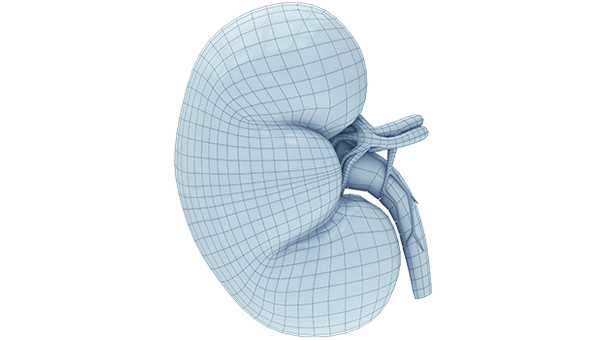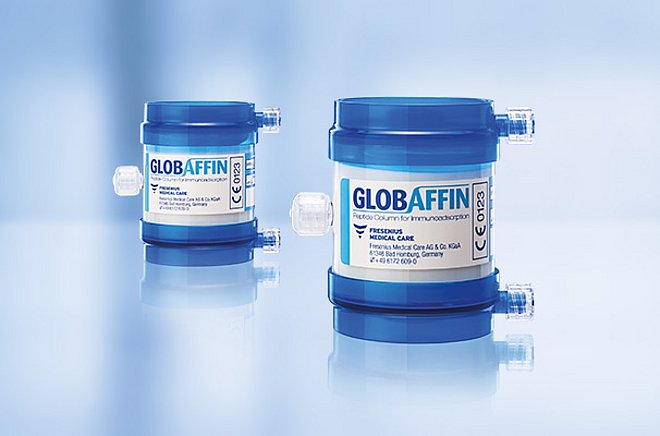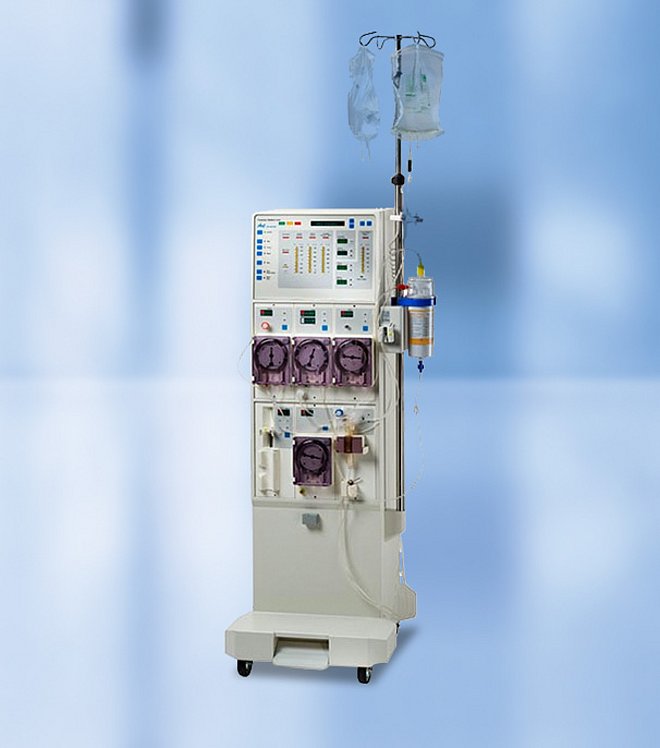Kidney and nephrology

Nephrology-related clinical indications
In addition to caring for patients with chronic kidney disease, Fresenius Medical Care provides related specialist expertise in therapeutic apheresis as well as the products required for this treatment. The main focus here is on desensitisation programmes for solid organ transplantation and the treatment of autoimmune diseases.
Transplantation
Acute or chronic antibody-mediated rejection frequently leads to organ loss. This is caused by antibodies directed against structures in the blood capillaries of the transplanted organ. Where such rejection reactions do not respond to drugs, they can be rapidly and effectively interrupted by immunoadsorption.1 Transplant recipients with pre-existing human leukocyte antigen (HLA) or ABO antibodies show an increased risk of transplant rejection. Preventive removal of antibodies against histocompatibility or blood group antigens using immunoadsorption is a proven established modality.2,3,4,5 The combination of immunoadsorption and MONET® Lipoprotein filtration is proven to be effective in removing both IgG-ABO and IgM-ABO antibodies.6,7
Nephritis
Nephritis is an inflammation of the kidneys that can involve different kidney structures. Nephritis is categorised into several different pathological patterns, which are broadly grouped into non-proliferative or proliferative types. Diagnosing the pattern of nephritis is important because the outcome and treatment differs according to type. The primary causes of nephritis are intrinsic to the kidney. Secondary causes are associated with certain infections (bacterial, viral or parasitic pathogens), drugs, systemic disorders (lupus, vasculitis) or diabetes. Clinically, nephritis affects kidney function and, in some cases, could lead to acute renal failure. Given the link between some nephritides and IgG-associated antibodies, immunoadsorption with GLOBBAFIN or Immunosorba® can offer an additional option beyond standard therapy.8
Membranous nephropathy
Membranous nephropathy (MN) is amongst the most common causes of nephrotic syndrome in adults worldwide. Primary or idiopathic MN is considered an autoimmune disease, in which IgG antibodies target PLA2R receptors at the glomerulus basal membrane. While the majority of patients with MN remain stable and experience either complete remission or partial remission, approximately 20% slowly progress to end-stage renal disease. Since the common immunosuppressive treatment regime has side effects, immunoadsorption with GLOBBAFIN or Immunosorba® may offer an additional option when it comes to removing IgG related antibodies. This theory is the subject of a current clinical investigation.9
Other indications
The following indications are also to be considered for therapeutic apheresis treatments:
- Rapidly progressive glomerulonephritis (RPGN)10
- Goodpasture’s syndrome10
- Recurrent focal segmental glomerulosclerosis (FSGS)11, 12, 13
1 Böhmig et al, Immunoadsorption in severe C4d-positive acute kidney allograft rejection: A randomized controlled trial. American Journal of Transplantation Jan. 2007; 7(1): 117–21.
2 Schwaiger et al, Deceased donor kidney transplantation across donor-specific antibody barriers: Predictors of antibody-mediated rejection. Nephrology Dialysis Transplantation Aug. 2016; 31(8): 1342–51.
3 Morath et al, Living donor kidney transplantation in crossmatch-positive patients enabled by peritransplant immunoadsorption and anti-CD20 therapy. Transplant International May 2012; 25(5): 506–17.
4 Bartel et al, Peritransplant immunoadsorption for positive crossmatch deceased donor kidney transplantation. American Journal of Transplantation Sep. 2010; 10(9): 2033–42.
5 Thölking et al, Antigen-specific versus non-antigen-specific immunoadsorption in ABO-incompatible renal transplantation. Public Library of Science 29 June 2015; 10(6).
6 Eskandary et al, ABO antibody and complement depletion by immunoadsorption combined with membrane filtration—a randomized, controlled, cross-over trial. Nephrology Dialysis Transplantation Mar. 2014; 29(3): 706–14.
7 Biesenbach et al, Effect of combined treatment with immunoadsorption and membrane filtration on plasma coagulation: Results of a randomized controlled crossover study. Journal of Clinical Apheresis Feb. 2016; 31(1): 29–37.
8 Stummvoll et al, Lupus nephritis: Prolonged immunoadsorption (IAS) reduces proteinuria and stabilizes global disease activity. Nephrology Dialysis Transplantation Feb. 2012; 27(2): 618–26.
9 Sandip Mitra. Phase II trial investigating the safety and feasibility of Peptide GAM Immunoadsorption in anti-PLA2R positive autoimmune membranous nephropathy. Health Research Authority, Research Summary: Aug. 2016; IRAS ID: 198481.
10 Biesenbach et al, Long-term outcome of anti-glomerular basement membrane antibody disease treated with immunoadsorption. Public Library of Science 31 Jul. 2014; 9(7): e103568.
11 Dantal et al, Effect of plasma protein adsorption on protein excretion in kidney-transplant recipients with recurrent nephrotic syndrome. New England Journal of Medicine 6 Jan. 1994; 330(1): 7–14.
12 Moriconi et al, Proteinuria in focal segmental glomerulosclerosis: Role of circulating factors and therapeutic approach. Renal Failure May–Jul. 2001; 23(3–4): 533–41.
13 Meyer et al, Immunoadsorbtion and rituximab therapy in a second living-related kidney transplant patient with recurrent focal segmental glomerulosclerosis. Transplant International Dec. 2007; 20(12): 1066–71.

